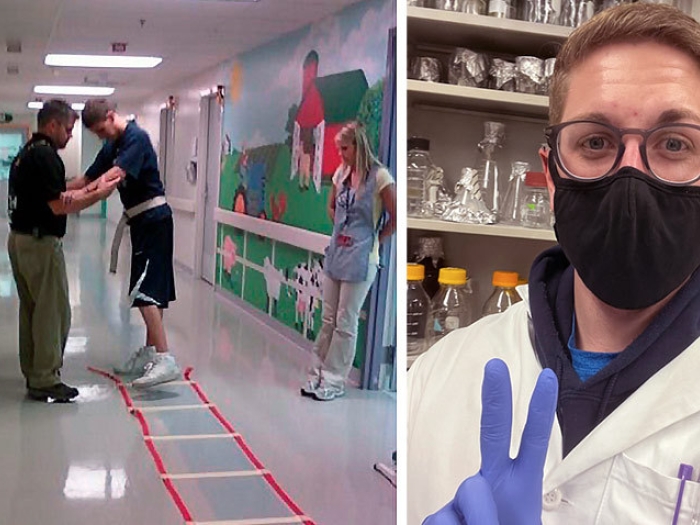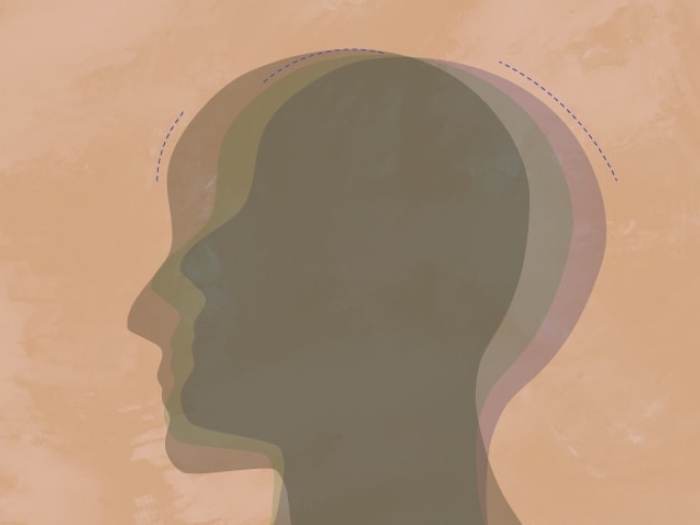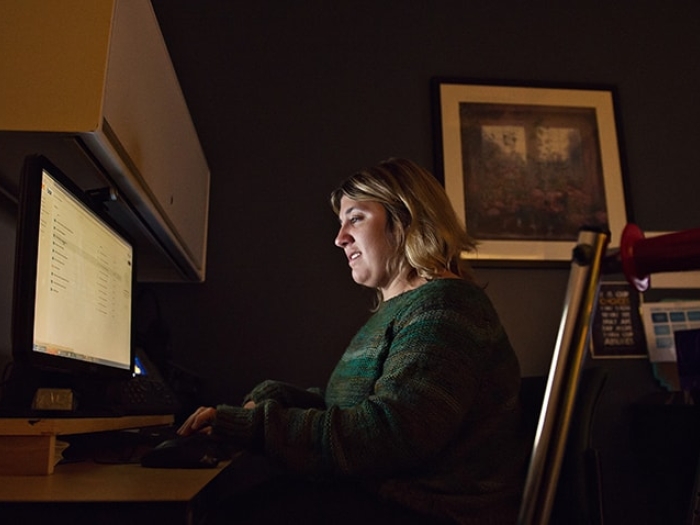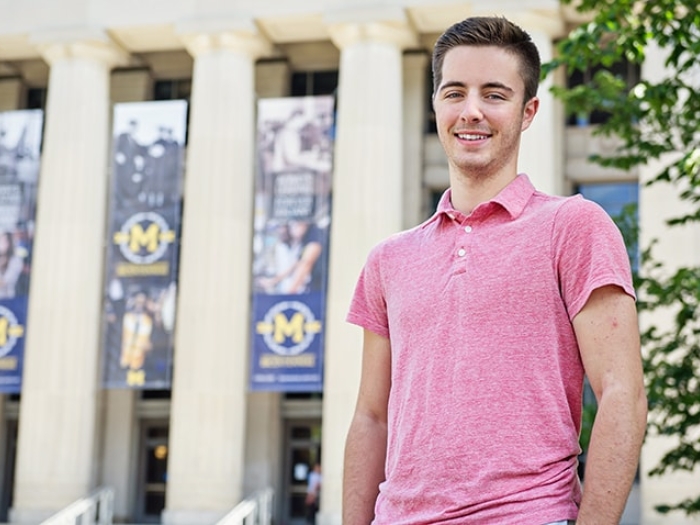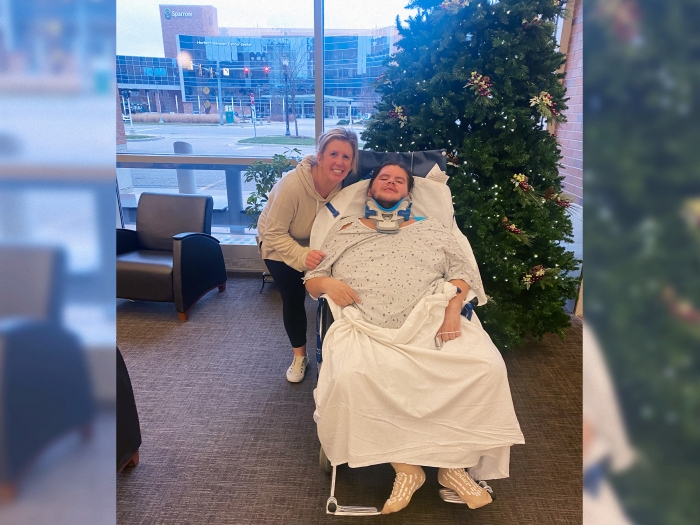A foster child in need receives years of expert care from Michigan Medicine along with the dedication of a nurturing caregiver.
5:00 AM
Author |

Sylvia Morris grew up wishing for a big house and 100 kids. Her wish came true in a way the 79-year-old could never have imagined.
Married at 16, she and her husband, Kenneth, began their family with two biological daughters. But over the years, their house also became a home to more than 200 foster children, many with significant mental and physical developmental needs.
"It's such a pleasure caring for these children," Morris says. "So many of them are not taken care of. We wanted to de-institutionalize them and give them a loving home."
It became the couple's lifelong pledge to foster children ranging from newborns to adults with all different health and family issues.
LISTEN UP: Add the new Michigan Medicine News Break to your Alexa-enabled device, or subscribe to our daily updates on iTunes, Google Play and Stitcher.
"We've had every race in our home … children of rape victims, abused children. Ken was so good with these kids," says Morris of her late husband, who passed away in 2005, just two months shy of their 50th wedding anniversary.
"We both had the same dream. We wanted to give these children a lesson in love."
Jimmy's journey
Today, Sylvia continues these lessons in love by caring for Jimmy, 39, the victim of shaken baby syndrome at just seven weeks old, which resulted in a traumatic brain injury.
"He has profound cognitive impairment, severe spastic quadriplegic cerebral palsy and epilepsy," says Michigan Medicine neurologist Simon Glynn, M.D., who has treated Jimmy for nearly a decade.
The young man is dependant on a wheelchair and has a tracheostomy which enables him to breathe, and a feeding tube for nutrition. He is also blind and requires oxygen.
Despite having essentially no voluntary control of his arms, hands or legs, "Jimmy smiles frequently and responds to Sylvia's voice," says Glynn.

The way a caregiver approaches care is important, and the degree to which a person can continue to be hopeful and optimistic seems clearly to make a difference in the quality of life for individuals like Jimmy.Simon Glynn, M.D.
"Jimmy is very fragile," Morris says. "He had burns on his legs as well as lice and various infections on his body when he came to live with us at three years old."
She recalls doctors telling her Jimmy might not live long.
"He was a very neglected little boy and has survived a great deal of trauma," she says of the young man she refers to as her miracle baby. "The doctors at the University of Michigan have done so much for him."
Not surprisingly, Jimmy loves all things University of Michigan, including his blue and maize clothes and has a bedroom decked out in U-M decor.
"He comes to every appointment dressed head to toe in the university colors," says Glynn.
"U-M has cared for so many of these children who might not be alive today without their help," Morris says, noting that all her foster children in need of medical attention have been treated at Michigan Medicine.
"In patients like Jimmy with very complex injuries and correspondingly complex care needs, it is critical that different medical specialists be coordinated in a team approach," says Glynn. "The University of Michigan has been able to do this for Jimmy, starting as a child, with careful coordination between the departments of physical medicine and pediatric neurology at C.S. Mott Children's Hospital. This approach has optimized care for Jimmy as well as for Sylvia's many other foster children."
A 24/7 commitment
Because of Jimmy's extensive physical challenges, he requires nursing care and an aid eight hours a day, along with the ongoing coordination of care that Morris provides.
"It's important to have one person who supervises and understands individuals like Jimmy and what matters to their quality of life," says Glynn. "As the primary caregiver, Sylvia takes on a role that most of us would find overwhelming."

"As an advocate for the patient, it is also important to be assertive in questioning different agencies, schools and the medical team, and Sylvia does this very well," Glynn says.
Morris keeps Jimmy on a regulated schedule, which begins with breakfast at 6:30 a.m. followed by medication at 7:30. By 9 a.m., he's ready for a glass of water and is then dressed for the day.
"I lay out his clothes every day and always make sure they match," Morris says proudly.
At 9:45 a.m., Jimmy's nurse arrives and meets with Morris to talk about his night and any health-related issues. Together, they clean his tracheotomy and get him ready for his daily jacuzzi bath.
MORE FROM MICHIGAN: Sign up for our weekly newsletter
The large, eight-bedroom home, situated on 11 country acres, has special handicap retrofits, including a bathroom designed by Morris that features a ceiling lift to help get Jimmy in and out of the tub. Over the years, the lift has also been used to help Morris' non-ambulatory children stand and walk.
After his bath, Jimmy's teeth are brushed and his hair is combed, followed by lunch at noon. Story time is next. Morris reads a variety of books to him, but Harry Potter is a favorite. The day continues with a stretching session to keep his hands and arms flexible. He then rests while listening to his favorite music, which includes lullabies and instrumentals, depending on his mood, says Morris.
In between the daily care and housework, Morris accompanies Jimmy to his many appointments at Michigan Medicine, including doctor visits, rehabilitation and equipment checks.
The dedicated caregiver's work seems endless as she looks after Jimmy as well as two other adults with special needs well into the night. Evenings are spent having dinner, praying and listening to a story or music before bed.
A labor of love
The Morris family has also opened their doors to the parents of many foster children, encouraging them to visit and learn how to interact and care for their child. "Children need to know their parents," she says.

"Every child Ken and I fostered left our home with love – whether they went back to their biological family, an adoptive family or heaven," Morris says.
Through the years, Morris has remained a vocal proponent of foster parenting, especially when she reflects on its personal rewards and the impact it makes on the lives of innocent children.
"For Sylvia, caring for her children has clearly been very rewarding," says Glynn. "The way a caregiver approaches care is important, and the degree to which a person can continue to be hopeful and optimistic seems clearly to make a difference in the quality of life for individuals like Jimmy."
Having cared for so many foster children, Sylvia has also developed an outlook that is realistic, says Glynn.
"She focuses on each day as it comes and celebrates the good things that happen that day. She sees the good in people and reminds us of the better side of our nature."
Morris is quick to point out that she doesn't want the spotlight on her, but on the need for help for medically fragile babies. "We need more foster homes," she says. "We need more of this L-O-V-E stuff."

Explore a variety of healthcare news & stories by visiting the Health Lab home page for more articles.

Department of Communication at Michigan Medicine
Want top health & research news weekly? Sign up for Health Lab’s newsletters today!

